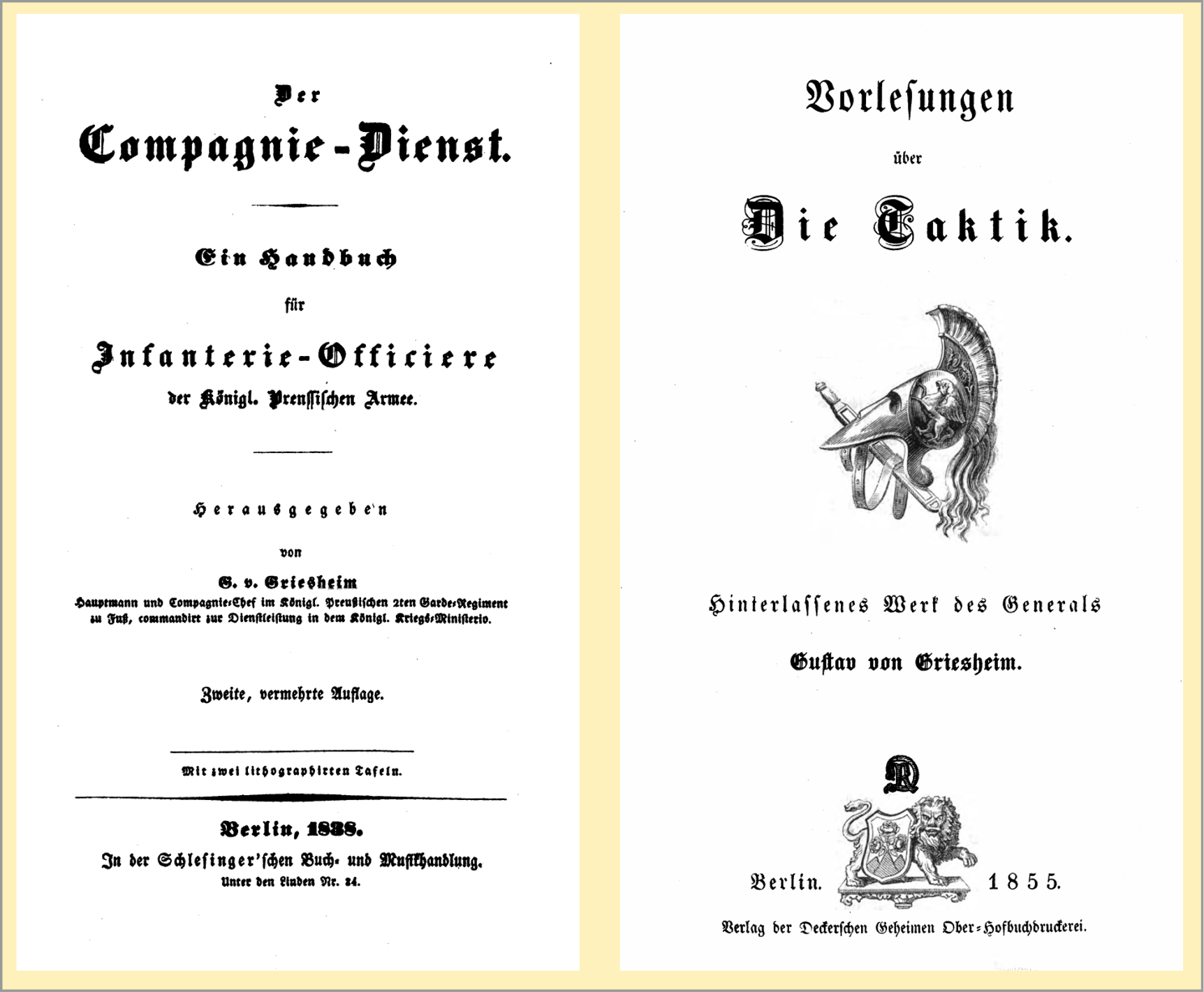
Kriegsspieler of the Month - Karl Gustav Julius von Griesheim (1798 - 1854)
by Jorit Wintjes
With this month’s Kriegsspieler we conclude our closer look at the inner circle around Reisswitz, that is at those who were explicitly mentioned by Reisswitz in his introduction for having made a significant contribution to the 1824 publication, or rather, as was explained last month, a crucial one given Reisswitz’ absence from Berlin much of the summer of 1824. With Griesheim another capable and successful officers appears on the stage, who not only rose to become one of Prussia’s first generals of the post-Napoleonic period as well as one of the youngest, but also shared with Vincke a considerable involvement in Prussian politics, though on the opposite side of the political spectrum. He also was one of the first officers attending not only the Kriegsschule but also Berlin university, studying with some of the leading civilian scholars of his time.
Born in 1798 as the son of a Prussian army captain, Griesheim entered the army in 1814, joining the Second Guards Regiment. He did not see any action during the Napoleonic wars, but entered Paris with the victorious Prussian army. Promoted lieutenant in 1815, he soon showed promise and was assigned to be regimental adjutant as well as Auditeuroffizier, the regiment’s judicial officer, in 1819. During this time he attended Berlin university, where Hegel and Humboldt were among his teachers; he not only impressed his professors, but also contributed to the edition of Hegel’s lectures by Eduard Gans (1797-1839), a noted Hegelian and professor at Berlin from 1826 onwards. Griesheim even worked on the editorial team of the journal “Jahrbücher für wissenschaftliche Kritik” founded by Geis and Hegel, which was one of the leading German philosophical journals for more than two decades.
His involvement in Hegelianism did not have a negative impact on Griesheim’s military activities. Instead, promoted captain in 1831 and put in charge of the second company of his regiment, he soon began to collect notes about his service as a company commander. These he turned into a book titled “Der Compagnie-Dienst”, a handbook for company commanders which was published in 1837. Griesheim’s handbook turned out to be a huge sucess, and within a year a second, expanded exdition was published; “Der Compagnie-Dienst” established Griesheim’s reputation as a military writer and resulted in his assignment to the Kriegsschule, where he served as a tactical instructor, as well as to the army ministry. Griesheim was the main contributor to the new infantry regulations published in 1847 and involved in various reorganizations and reforms in the Prussian army throughout the 1840s.
Promoted lieutenant colonel in 1847 he became head of the General Military Office (Allgemeines Militärdepartement) of the Prussian army, the Allgemeine Kriegsdepartement, a hugely influential position and one normally reserved for officers of general rank. During the following two years the political struggles during the revolution of 1848 dominated the work of the Prussian war ministry. Griesheim composed several pamphlets on army matters that were published anonymously, represented the ministry in the Prussian national assembly and in February 1849 even entered the newly established Prussian parliament. In marked contrast to Vincke, Griesheim held ultra-conservative views and became the most prominent representative of the Prussian Militärpartei, resenting both constitutional concessions and German unification unless under Prussian hegemony and with the preservation of a Prussian national identity. Apart from his involvement in politics Griesheim was also responsible for the drafting of several military treaties concluded by Prussia with other German states like Mecklenburg-Strelitz or Braunschweig.
Promoted colonel, Griesheim became the first commanding officer of the Prussian garrison of Koblenz, where between 1817 and 1834 Prussia’s largest and most modern fortress had been contructed. He continued to work as a military writer while at Koblenz and published on mobilization issues. In 1853 Griesheim was promoted major general, but died barely a year later of a rare kidney disease. One of his students at the Kriegsschule, Arthur Ehrenfried Waldemar von Horn (1819-1893), who would rise to the rank of major general himself, published his lectures on tactics after his death; the “Vorlesungen über die Taktik” proved to be as influential as Griesheim’s “Der Compagnie-Dienst”.

Griesheim’s two most influential publications, the “Compagnie-Dienst” originally published in 1837 and the posthumously published “Vorlesungen”.
There is no modern in-depth study on Griesheim extant, although several shorter biographies exist, and due to his involvement in Prussian military politics he also appears now and then in general literature. The most extensive coverage of his life can be found in an anonymous piece published barely a few weeks after his death as a supplement to the Prussian army’s military journal, the Militair-Wochenblatt (Anonymus. 1854. Zur Erinnerung an den Generalmajor von Griesheim. Beiheft zum Militair-Wochenblatt für Januar 1854. Berlin: Mittler); it is, however, quite hagiographic in character.
So much for this month’s Kriegsspieler. In the history of the Prussian Kriegsspiel, the next logical group of Kriegsspielers to look at would be the officers involved in the 1828 Supplement. There is however one additional officer, Friedrich Adrian Herwarth von Bittenfeld, who has been associated by contemporaries with the initial group around Reisswitz although he is not directly mentioned in Reisswitz’ introduction. For more on him see next month’s installment of Kriegsspieler of the Month.